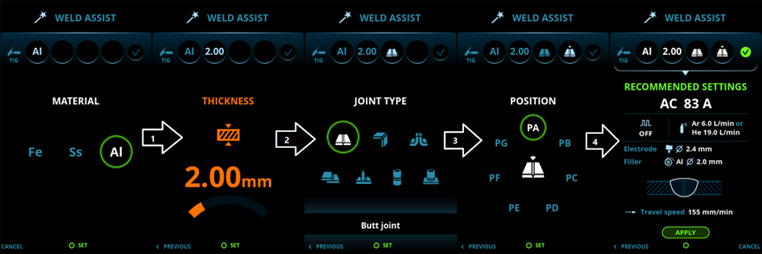Successful welding relies on a combination of parameter settings and selections. Equipment setup and parameter selection are influenced by a variety of knowledge-based factors, including substrate, joint type, weld position, and more. While welding procedure specifications (WPS) support the decision-making process, assisted machine-embedded technologies that guide the user to the correct and appropriate welding parameter settings are now being developed throughout the industry. An example of such technology is Weld Assist, a wizard-like function.
By performing a simple step-by-step process on a panel screen, Weld Assist can determine the optimal parameters for various TIG welding applications. All instructions here are based on weld testing and welding standards.
The process is based on four basic variables for the weld application at hand. The machine requires these variables one at a time.
1. Base material
A choice of steel (Fe), stainless steel (Ss) and aluminum (Al) is available. In a DC power source, the selection is limited to steel and stainless steel.
2. Material thickness
The selection range is from 0.5 mm to 10 mm. This value affects the choice of welding current and bevel shape by the auxiliary function.
3. Joint type
Available joint types include all common joint types for plate/plate and pipe assemblies.
4. Weld position
PA, PB, PC, PD, PE, PF, PG can be selected. since the graphics are used to illustrate the selection of joint types and weld positions, expertise in the abbreviations used, such as those found in welding standards, is not required.

Weld Assist selection process
Based on these four selections, Weld Assist adjusts the weld current so that the molten metal performs optimally in the welding application at hand. The screen displays the recommended current type, weld current and pulse use as well as recommendations for electrode size, filler wire, gas flow, bevel type, weld channel profile and travel speed.
Weld Assist offers many opportunities for welding professionals. Depending on their level of experience, welders can utilize this assisted welding technology in the way that best suits them. For example, Weld Assist is a great tool for learning welders because it helps ensure that welding standards and best welding practices are followed. Consistent use of this feature also helps to provide insight into how variables and parameters can change in different TIG welding applications.
On the other hand, novice welders may not know which current type to use or have any idea of the welding current requirements for each application. weld Assist makes it easy to automatically obtain both variables and produce satisfactory results without repeated trials.
Weld Assist can also be used for demanding, specialized welding applications. Near-optimal setups can be achieved quickly and easily without early experience or separate learning times to understand when to use new materials, joint types and weld positions. Generating preliminary weld procedure specifications (pWPS) is also fast and easy because many of the required variables can be read at a glance from the display.
The use of Weld Assist increases productivity and saves money in many ways. Save time and reduce the number of test pieces by eliminating the need for trial and error. If practice with trial parts is not possible, scrap and rejects are significantly reduced and the weld quality (in terms of weld parameters) is high from the start.
In many cases, the use of Weld Assist also makes it possible to select the correct settings much faster, as key parameters such as current type and relevant special parameters are automatically selected with just a few button presses. For a trained operator, the Weld Assist selection procedure takes only a few seconds to perform, whereas it takes much longer to adjust each setting individually.
Previous: Single Mast Aerial Working Platform
Next: Wire Cut EDM, Wire EDM, CNC Wire Cut Machine, CNC Wirecut EDM
Copyright:@2020-2021
Comments Please sign in or sign up to post.
0
0 of 500 characters used